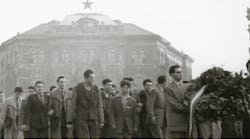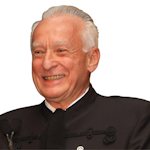In this column, I usually write about process control systems—often, designs that contain some errors—so their correction gives me an opportunity to show what we can learn from the past mistakes of others. In contrast, this month I intend to discuss what we should learn from our past handling of large historical processes, those having the potential to trigger world wars. One example of inaction was when we tolerated Hitler's swallowing up of Czechoslovakia in 1939. And an example of keeping a historical process under control was when we didn't tolerate Khrushchev’s placement of Soviet nuclear missiles in Cuba in 1962. It seems to me the inaction of 1939 helped triggered WWII, while our action in 1962 helped prevent WWIII.
From these historical events, our leaders should have learned that the appetite of dictators is never satisfied, that they will never stop swallowing up other nations until they're stopped by force. Force is the only language they understand, and the sooner that force is applied, the less of it is needed to stop them.
Today, while Putin "liberates" Ukraine, all that would be needed to stop him would be for the EU to close the Ukrainian air space to all Russian planes.
Is history repeating itself?
Being a former Hungarian freedom fighter, I would like to share with you some 66-year-old memories of what it's like to be "liberated" by the Russians. Then we’ll return to the present crisis.
After appearing to withdraw from Hungary in 1956, the Russians secretly brought in fresh troops, while at the same time inviting a delegation of the free Hungarian government to their headquarters to discuss the details of the total Russian withdrawal from Hungary.
They only asked for Hungary not to join NATO, and offered to work out the details of the withdrawal with the military leaders of Hungary at the Russian headquarters. Upon the arrival of our delegation at the Russian headquarters, they were arrested and the second invasion started against a nation left without military leaders. The average Hungarians just watched as the endless columns of Russian tanks entered Budapest.
Naturally, we still put up a fight, during which I was captured, but later managed to escape. When I was saying goodbye to the family, it was the only time I've seen my father cry. Later, in 1958, the Prime Minister of our 1,000-year-old European nation, Imre Nagy, was hanged. When the hood was pulled over his head, his eyeglasses fell to the ground and he calmly asked the hangman, "Please put back my glasses." I just hope that the Western democracies—particularly Volodymyr Zelenskyy and his family—will learn from that lesson.
Human future is at stake
The consequences of the Ukraine crisis are more serious than any earlier ones because they're diverting our attention from other challenges that mankind has never faced before. This summer, ISA is publishing a book of mine titled, "Controlling the Future." In that book, I show that humankind has reached a fork on the evolutionary road because, from now on, our evolution is no longer directed by nature alone but also by our own decisions. This is a drastic change because now we can change both our cultural and physical environments. It's critical that at this point we select the right road and we do it in time because the sign on the other road reads "Dead End." We must shake off complacency, stop living in delusion, and face the threat that's the size of civilized life itself.
In this new book, I provide detailed calculations showing that our cultural and physical environments are at risk as they evolve out of control and in the wrong direction. I show that some of the presently operating "control loops" are actually reverse acting, and that some of the secondary processes that are triggered have positive feedbacks, are self-accelerating and are approaching their tipping points. On the other hand, I also show that we have only about one decade to convert to a both culturally and physically sustainable future. We know how to do it, but we must not allow the "Putin War" to distract our attention.
AI impacting our cultural environment
At the same time, artificial intelligence (AI) has opened a new chapter in human history. Today, the development of this new tool is completely out of control. And, though it could take us into a better future, if left uncontrolled, it could also take us onto the slippery slope of self-destruction.
Over the last centuries, human culture started to recognize that constitutions are needed to protect society from the self-serving depravities of autocratic leaders. We were guided to the formation of democracies, which on the one hand satisfy the most powerful human thirst—the thirst for liberty—and on the other hand accepts Jefferson's view that "all men are created equal," so each vote must have the same weight. This goal was further broadened, when the Statue of Liberty invited to our shores "the huddled masses" of the world, who are "yearning to breathe free."
So, what does this have to do with AI and with the evolution of "truthless" culture on our planet? Unfortunately, the answer is simple, AI in the wrong hands can make us vulnerable, not only to cybercriminals attacking our critical infrastructure, electric grid, energy pipelines, water supplies, mass transit, nuclear power plants or breaking into government and private servers, but it can be used (as in Ukraine) to guide autonomous drones or missiles that can attack targets with or without human supervision or control.
Our cultural environment must also be protected. The time has arrived for another Geneva Convention to set the legal limits for the allowable use and applications of AI. Global institutions, regulations and enforcement structures are needed to protect us from Orwell's Big Brother or from Vladimir Putin, who said, “Whoever masters AI will become the ruler of the world.”
'Truthless' culture can't fight climate change
Global warming represents an existential risk for us all and we can't stop it without a total global effort. Yet, a global effort can't be waged if societies can be brainwashed to the point where their confidence in the judgments of their own scientific institutions and even in their democratically elected leaders is destroyed. The worst consequence of Putin's war is that it distracts attention and resources from fighting climate change. It creates an atmosphere in which our resources aren't invested in financing the conversion into a solar-hydrogen energy economy, but are wasted on buying weapons and on paying skyrocketing prices for oil and gas.
In this truthless age, it's possible to call natural gas (a greenhouse gas more powerful than carbon dioxide) a "transitional fuel," or promote electric cars, as if their batteries weren't recharged by coal-burning power plants. It's also possible for a single U.S. senator to make millions of dollars by keeping coal-burning power plants in operation, or make it possible for an ex-chancellor of Germany to make millions by supporting the northern gas pipeline that keeps Germany hooked on Russian natural gas.
Fortunately, I also know that the "Putins of history" can't stop progress. I'm optimistic because the educated young of today understand what it will take to get rid of fossil fuels and convert to a solar-hydrogen energy economy. I also know that, even if individually we feel as powerless as snowflakes, together we can create an avalanche that erases this truthless age.







